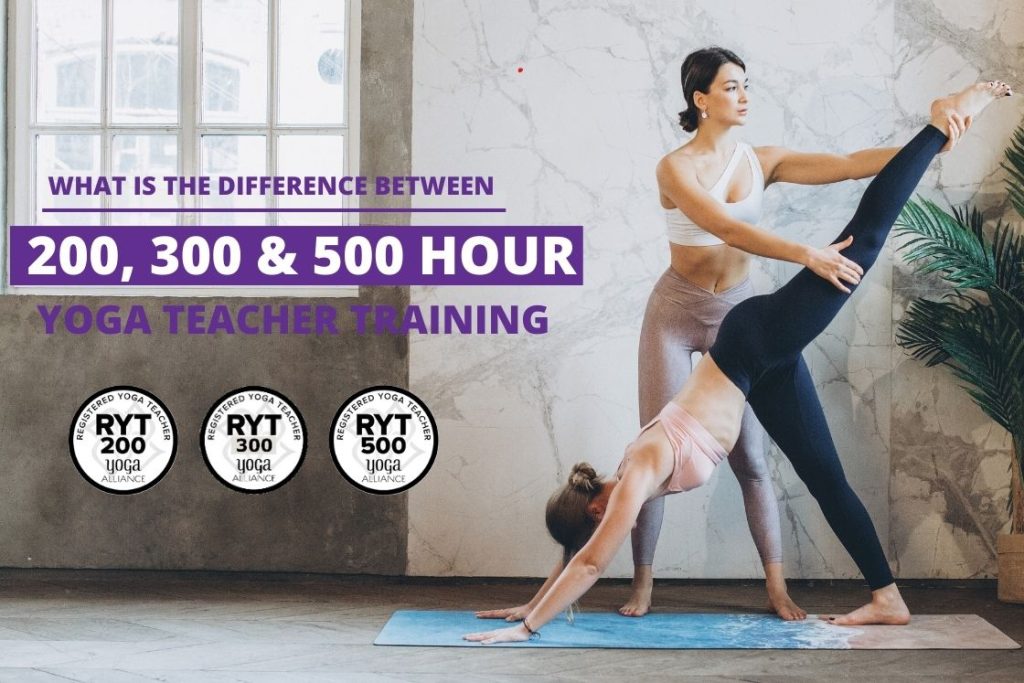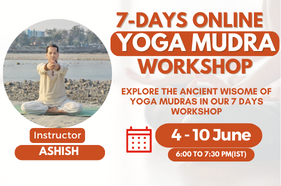
You are planning to start your career as a Yoga Teacher? That’s wonderful! And, congratulations!
Now, you need to figure out which YTT course to enroll in, in order to get the maximum value.
Well, every YTT course has its own purpose and value: but it eventually boils down to your immediate necessities and future plans.
The 200-hour course covers all the fundamentals of yoga, in terms of practice, theory, anatomy, teaching practices, and philosophy.
The 300-hour course covers the same fields of study as the 200-hour course—except this time you will need to go deeper into each topic and get different hour-allocation for each field of study. Additionally, the 300-hour course has more provisioned hours on an elective field of study. This helps you specialize in a particular aspect of yoga or a particular style of yoga—for example, Vinyasa, Ashtanga, Hatha, Kundalini and so on.
Finally, the 500-hour YTT course is simply a combination of a 200-hour YTT course and a 300-hour YTT course. The 500-hour course allows you to learn, in a single go, from the basics to the advanced.
**Note: It is important to note that the above-mentioned information is only in the context of Yoga Alliance, which is one of the most, globally, trusted organizations for acquiring Yoga Teacher training standardization, certification, and registration.
What are the Differences Between YTTC, RYS, and RYT?
If you have stumbled across a few other URLs on the difference between 200, 300, and 500-hour Yoga Teacher Training course—then you have probably stumbled across a few other terms as well. Terms that on the first look may appear confusingly similar—YTTC, RYS, and RYT.
- YTTC—Yoga Teacher Training Course
- RYS—Registered Yoga School
- RYT—Registered Yoga Teacher
So, how are these terms related?
The best way to understand how these terms come together is to understand how to become a Registered Yoga Teacher from Yoga Alliance, with 500 hours of Yoga Teacher Training.
A registered yoga teacher with 500 hours of Yoga Teacher Training, is termed as RYT 500, and the following are the requirements:
- Has either, completed a 500-hour YTTC from a Yoga School registered with Yoga Alliance to provide a 500-hour course (RYS 500).
- Or, Has completed a 200-hour YTTC from a RYS 200, and has also completed a 300-hour YTTC from the same RYS, or a different RYS registered as RYS 300.
- Has a total minimum of 100 hours teaching experience, either after completing 200-hour YTTC, or directly after completing 500-hour YTTC.
200-Hour Yoga Teacher Training: Foundation Course
The 200-hour YTT course is the most common starting point for aspiring yoga teachers. It covers the essentials of yoga, including practice, theory, anatomy, teaching methods, and philosophy.
- Eligibility: No formal prerequisites, but prior yoga practice and a sound mind and body are recommended.
- Duration: Typically 3-4 weeks.
- Fees: USD 600-800 (online or without accommodation), USD 1200-3000 (with accommodation). INR 20,000-30,000 (offline), INR 45,000-100,000 (with accommodation).
- Post-Training: Eligible to register as RYT 200 and teach beginner-level and general yoga classes.
Note: For offline classes, food is mostly included. And, the fee for offline classes varies a lot, from school to school, depending on the quality of accommodation and facilities provided. Ideally, the training quality doesn’t vary much with fees because every RYS needs to maintain very strict training standards in order to maintain their registration with Yoga Alliance.
Course Breakdown
- 100 hours: Techniques, training, and practice (including poses, pranayama, kriyas, and meditation).
- 20 hours: Teaching methodology (communication, time management, student interaction).
- 20 hours: Anatomy and physiology.
- 30 hours: Yoga philosophy, lifestyle, and ethics.
- 10 hours: Practicum (teaching practice and feedback).
- 55 hours: Electives.
- 20 hours: Non-contact hours (self-study and assignments).
300-Hour Yoga Teacher Training: Advanced Specialisation
The 300-hour YTT course builds on the 200-hour foundation, offering advanced training and specialisation in different styles of yoga.
- Eligibility: Completion of a 200-hour YTT. No specific teaching experience required, but 100 hours of teaching experience is beneficial.
- Duration: Typically 4-5 weeks.
- Fees: USD 600-800 (online or without accommodation), USD 1200-3000 (with accommodation). INR 20,000-30,000 (offline), INR 45,000-100,000 (with accommodation).
- Post-Training: Opportunity to register as RYT 500 with prior teaching experience or gain the experience after certification.
Course Breakdown:
- 50 hours: Techniques, training, and practice.
- 5 hours: Teaching methodology.
- 15 hours: Anatomy and physiology.
- 30 hours: Yoga philosophy, lifestyle, and ethics.
- 30 hours: Practicum.
- 140 hours: Electives (allowing for specialisation).
- 30 hours: Self-practice and learning activities.
If you have noticed both the 200-hour and 300-hour courses have the same subjects, one major difference, is the hour distribution. In the 300-hour course, the elective is 140 hours, allowing you to specialize in a particular aspect. Additionally, the 300-hour course also goes in-depth with each sub-discipline of yoga teaching. For, example the 300-hour course deals specifically with alignments of many advanced poses like Ardha Baddha Padmottanasana, Urdhva Prasarita Eka Padasana, Pincha Mayurasana, Eka Hasta Bhujasana, etc.
The 300-hour course also tackles anatomy, as well as philosophy, in detail. For example, while the 200-hour course covers basic philosophies like Ashtangas, Pancha Vrittis, and such—the 300-hour course digs deeper into nuanced philosophies from Upavedas, Shada Ripus, Puranas, Bhagavad Gita, Sadhana Chatushtaya, Shad Darshanas, Antahkaranas, etc.
500-Hour Yoga Teacher Training: Comprehensive Mastery
The 500-hour YTT course combines the 200-hour and 300-hour training into a single comprehensive program, covering everything from basic to advanced levels.
- Eligibility: Similar to the 200-hour course, with no specific prerequisites. Ideal for those wanting extensive training in one go.
- Duration: Typically 8-10 weeks.
- Fees: USD 1000 (online or without accommodation), USD 1600-4500 (with accommodation). INR 50,000-70,000 (offline), INR 100,000-250,000 (with accommodation).
- Post-Training: Eligible for RYT 500 registration. Teaching experience of 100 hours needed for certification.
Course Breakdown
- 150 hours: Techniques, training, and practice.
- 30 hours: Teaching methodology.
- 35 hours: Anatomy and physiology.
- 60 hours: Yoga philosophy, lifestyle, and ethics.
- 40 hours: Practicum.
- 145 hours: Electives.
- 40 hours: Self-practice and learning activities.
As you have guessed by now the hour-allocation and subject depth in 500-hour YTTC is an integration of the two—200-hour and 300-hour—courses.
Which Course Should You Choose?
Yoga Alliance training courses are very flexible. They allow you to pursue your career in a variety of ways depending on where you are in your life/career. Below are some ways you can consider when selecting a YTTC.
- 200-Hour YTTC: Ideal for beginners starting their yoga teaching journey. Follow this with 100 hours of teaching experience to register as RYT 200.
- 300-Hour YTTC: Suitable if you have completed the 200-hour course and gained some teaching experience. This course allows you to specialise and register as RYT 500.
- 500-Hour YTTC: Perfect if you want comprehensive training from the basics to advanced levels in one go. You will need 100 hours of teaching experience to become an RYT 500.
Advancing Your Certification -Upgrading Your RYT Registration to E-RYT
Yoga allowance allows experienced teachers to upgrade their certification. Once you gather a teaching experience of 1000 hours and have been teaching for over 2 years, you can upgrade your RYT 200 registration to E-RYT 200, and your RYT 500 registration to E-RYT 500.
Continuous Development and RYT Renewal
Remember yoga is a field that requires constant learning and growth even from teachers. Svadhyaya, or self-learning, is one of the most important aspects even in Yoga Sutras by Patanjali. You will not only continue to uphold the integrity of your teaching quality, but you will also need to maintain the standards set by Yoga Alliance to be able to renew your registration every 3 years.
All the best on your Yoga Teaching Journey. May you get to nurture many souls into beings with pure energy!




